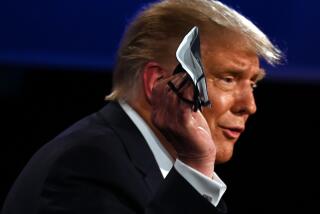Study: ‘Placebo Effect’ May Not Be Real Either
- Share via
BOSTON — Surprising new evidence has called into question the existence of the “placebo effect,” the widely accepted principle that people with various illnesses will often improve if given a dummy pill or a sham treatment.
For 50 years, doctors have been taught that this phenomenon is partly responsible for drugs’ effectiveness. Researchers have taken it into account when testing new medicines. Biologists and psychologists have searched for its cause. Ethicists have even debated whether doctors could justifiably deceive patients to take advantage of it.
But in the most comprehensive effort yet to evaluate whether placebos work, Danish researchers conclude that they have little effect after all and should not be used outside research settings. Their study appears in today’s issue of the New England Journal of Medicine.
An exhaustive analysis of 114 medical studies published over a 53-year span has concluded that in most cases, placebos are no more effective than no treatment at all. The only exception: They may be better than nothing for relieving pain, in part because pain is a very subjective sensation.
“There is no justification for the use of placebos” except in an experimental setting, said Drs. Asbjorn Hrobjartsson of the University of Copenhagen and Peter C. Gotzsche of the Nordic Cochrane Center.
Their findings defy conventional wisdom, forged in part by a 1955 article in the Journal of the American Medical Assn. that said placebos helped patients 35% of the time. Since then, some doctors have recommended using placebos in medical treatment.
The ethics of placebo use--both in medical practice and in research--have been hotly debated in recent years. In addition, proponents of alternative therapies often point to patients’ responses to placebos as evidence of the mind’s power to heal.
“I’m surprised by this,” said David Spiegel, a professor of psychiatry at Stanford University School of Medicine. “What this shows is not that [the placebo effect] doesn’t exist, but that it doesn’t answer all problems.”
The report should change the way doctors make decisions about treatment, said John C. Bailar, a professor emeritus of health studies at the University of Chicago who wrote an editorial accompanying the study.
“Now . . . anybody who says there is a placebo effect has the burden of proof,” Bailar said. “I think it’s going to have quite a substantial effect on how medicine is practiced.”
Doctors give a placebo whenever they prescribe a drug merely to placate a patient, without evidence that it is necessary or effective, Bailar noted. “An outstanding example is the prescription of antibiotics for the common cold, which is a viral disease” and therefore unaffected by antibiotics.






